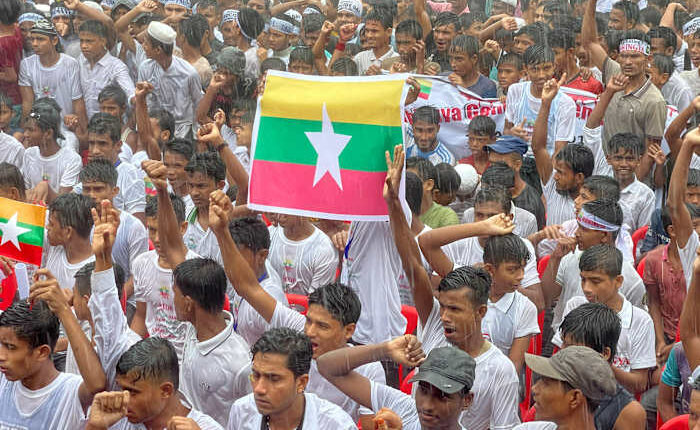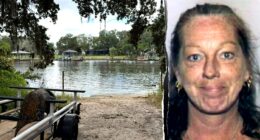Share this @internewscast.com

COX’S BAZAR – This area has become a temporary home for tens of thousands of Rohingya refugees from Myanmar who are living in numerous camps across Bangladesh. These refugees are commemorating the eighth year since their mass migration, calling for a safe return to their homeland in Rakhine state.
On Monday, the refugees gathered in an open space within a camp at Kutupalong, located in the Cox’s Bazar district of Bangladesh. They displayed banners and signs with messages like “No more refugee life” and “Repatriation the ultimate solution.”
The day was marked as “Rohingya Genocide Remembrance Day.”
Additionally, a separate three-day meeting commenced on Sunday in Cox’s Bazar. This conference involves international dignitaries, United Nations representatives, diplomats, and Bangladesh’s interim government, all coming together to deliberate on providing refugees with essential supplies and accelerating the process of repatriation.
Bangladesh’s interim leader, Nobel Peace Prize laureate Muhammad Yunus, is expected to speak Monday.
Although Bangladesh and the U.N. have been advocating for the return of over a million refugees, the situation in Myanmar remains unstable, especially in the Rakhine state. Rohingya refugees in Bangladesh face difficulties such as reduced aid from donors.
The mass exodus of Rohingya Muslims from Myanmar to Bangladesh started on August 25, 2017. They fled on foot and by boat amid shelling, mass killings, and other violent acts in Rakhine state, a territory now controlled by the Arakan Army insurgents fighting against Myanmar government forces.
The Monday protests at Kutupalong, one of the more than 30 Rohingya camps, highlighted refugee frustrations over the strengthening of the Arakan Army and the resulting unpredictability concerning their hoped-for return.
“We are here today because the Myanmar military and the Arakan army committed genocide against our community. We are here today to remember the people who lost their lives and who sacrificed their lives for being Muslim,” Nur Aziz, 19, told The Associated Press.
“We want to go back to our country with equal rights like other ethnic groups in Myanmar. The rights they are enjoying in Myanmar as citizens of the country, we too want to enjoy the same rights,” he said.
Myanmar launched a brutal crackdown in August 2017 following insurgent attacks on guard posts in Rakhine state. The scale, organization and ferocity of the operation led to accusations of ethnic cleansing and genocide from the international community, including the U.N.
The Bangladesh government, which was led at the time by former Prime Minister Sheikh Hasina, ordered the border to be opened, eventually allowing more than 700,000 refugees to take shelter in the Muslim-majority nation. The influx was in addition to more than 300,000 refugees who already had lived in Bangladesh for decades in the wake of previous violence perpetrated by Myanmar’s military.
Since 2017, Bangladesh has attempted at least twice to send back the refugees and has urged the international community to build pressure on Myanmar’s government to establish a peaceful environment that could assist their repatriation. The governments under Hasina and Yunus also have sought repatriation support from China.
___
Julhas Alam contributed from Dhaka, Bangladesh.
Copyright 2025 The Associated Press. All rights reserved. This material may not be published, broadcast, rewritten or redistributed without permission.












